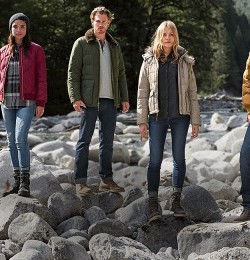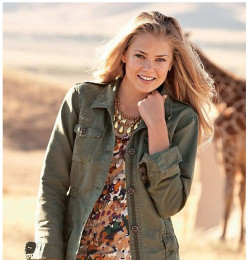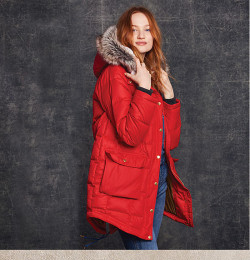

Eddie Bauer
Bellevue, WA 98004
USA
About
founded by
Eddie Bauer
belongs to
Commerzbank
about
Eddie Bauer Holdings Inc. is a holding company that operates the Eddie Bauer clothing store chain. Headquartered in Bellevue, Washington, the company formed subsequent to Eddie Bauer's former parent company, Spiegel, Inc. declaring bankruptcy. Eddie Bauer currently operates three independent sales channels:
Retail Stores - Sells "premium" Eddie Bauer merchandise
Outlet Stores - Sells Eddie Bauer merchandise and inventory overstocks at value or clearance price points
Direct Order Center - Catalogs utilizing call centers in Saint John, New Brunswick and Groveport, Ohio and the website (EddieBauer.com)
The company was first established in 1920 in Seattle by Pacific Northwest Outdoorsman, Eddie Bauer (1899 � 1986). In 1940 Bauer patented the first quilted down jacket. He went on to patent numerous other designs and was the first independent company that the United States Army hired and allowed to use a logo on the Army issued uniform.
Bauer retired and sold the company in 1968. General Mills bought Eddie Bauer in 1971, and Spiegel bought it from General Mills in 1988. In 2003, Spiegel, Inc., entered bankruptcy. The Spiegel catalog and all other assets were sold, except for Eddie Bauer. In May 2005, Spiegel, Inc., emerged from bankruptcy under the name "Eddie Bauer Holdings" and owned primarily by Commerzbank. In addition to the three sales channels the company operates a distribution and fulfillment center in Groveport, Ohio; an IT facility in Westmont, Illinois; and a distribution center in Vaughan, Ontario. Eddie Bauer is also a minority participant in joint venture operations in Japan and Germany that include retail stores, catalogs, and websites. The company also selectively licenses the Eddie Bauer brand name and logo for various products sold through other companies including eyewear, furniture, bicycles, and Ford Motor Company's SUVs.
Eddie Bauer's flagship store is in downtown Seattle's Pacific Place mall.
Eddie Bauer Holdings, Inc. filed for Chapter 11 bankruptcy protection in Delaware on June 17, 2009.
In 1920, Eddie Bauer, at the age of 21 established his first store in downtown Seattle. �Eddie Bauer�s Tennis Shop� opened in the back of a local hunting and fishing store. He first specialized in building and repairing tennis rackets and the shop was only open during the tennis season, Bauer spent the rest of the year pursuing his own sportsman activities. Eventually Bauer expanded his line of merchandise to include his own hand-made golf clubs and fishing tackle and he changed the name of his store to �Eddie Bauer�s Sport Shop.� Bauer would go on to develop and patent a standardized shuttlecock. The Bauer Shuttlecock popularized badminton in the United States. While operating this first store Bauer developed his creed, "To give you such outstanding quality, value, service and guarantee that we may be worthy of your high esteem," still used by the modern company.
While on a winter fishing trip in Washington, Eddie Bauer developed hypothermia. After this he began trying to develop alternatives to heavy wool garments used by outdoorsmen at the time. He attempted to offset the bulkiness of down by quilting a down-filled jacket. In 1940, Bauer then patented the first quilted goose down-insulated jacket in the United States: U.S. Design Patent 119,122 and introduced it in his store as "The Skyliner." Bauer took out more than 20 patents on various outdoor clothing and sporting equipment between 1934 and 1937.
In 1942 the United States Army Air Corps commissioned Eddie Bauer to develop the B-9 Flight Parka. More than 50,000 parkas were manufactured for World War II airmen. The parka was designed to keep pilots warm at high altitudes. Of all government suppliers, Eddie Bauer alone was granted permission to affix his company logo to his products used by the army. In addition to the parkas, Eddie Bauer supplied the army with backpacks, pants, and sleeping bags all of which became standard issue for American troops in the war. Prior to his involvement the army had a shortage in sleeping bags, Bauer eventually sold over 100,000 sleeping bags to the armed services.
In 1945, soon after he began selling women's clothing as well as men's, Eddie Bauer issued his first mail-order catalog. The original mailing list included the names of 14,000 soldiers who had worn Eddie Bauer clothing provided by the army during their service. By 1949, Bauer was employing 125 seamstresses. He eventually closed his downtown store and got out of retailing, except for showroom sales at his Seattle factory.
By 1950, Eddie Bauer's health was declining due to overwork and a serious back injury. He took on local businessman and his hunting partner, William F. Niemi. Bauer transferred all of the common stock in Eddie Bauer, Inc. to Niemi who reorganized the store and improved cash flow. It was with Niemi that Bauer decided to focus his efforts on the mail order catalog. By 1953 catalog sales were totaled at $50,000. At this point Bauer returned to being a share-holder in the company and formed a fifty-fifty partnership with Niemi. Throughout the 1950s Eddie Bauer, Inc. outfitted various scientific and exploratory expeditions.
In 1960 Eddie Bauer and William Niemi took on their sons, Eddie C. Bauer and William Niemi Jr. as partners in the company. Eddie Bauer went on to supply his equipment for the American K2 Himalayan Expedition and several journeys through Antarctica. In 1963, James W. Whittaker, the first American to climb Mount Everest, was wearing an Eddie Bauer parka. He wore Bauer's products during his whole expedition.
In 1968, Eddie Bauer retired and he and his son sold their half of the business to William Niemi and his son for $1.5 million. A group of investors, who had helped finance the buyout gained stock in the company. That same year the first store outside of Seattle opened, this was in San Francisco. In 1970 their first large store opened in downtown Seattle. In order to appeal to a broader range of consumers, Niemi shifted the company's focus featuring casual lifestyle apparel. The emphasis on women�s apparel and accessories was greatly expanded in all stores, as well.
In 1971, William Niemi sold the company to General Mills. After the sale the company shifted its focus toward casual clothing and expanded to 61 stores and made $250 million in sales by 1988. This shift included the company dropping the tagline "Expedition Outfitter." Eddie Bauer also began a cross-branding partnership with Ford in 1983 to produce Eddie Bauer Edition Ford vehicles. In 1984 the first Eddie Bauer Edition Ford debuted: the limited edition "Eddie Bauer Bronco." In 1987 Eddie Bauer introduced the "All Week Long" concept. This was meant to provide women with clothing they can wear throughout the week (e.g. at work) as opposed to just weekend wear. This concept was sold solely through the catalog when the first All Week Long store opened in Portland, OR in the summer of 1991.
Spiegel purchased Eddie Bauer from General Mills in 1988. Aggressive expansion continued and within the first year the company had expanded from 60 to 99 stores. By 1996 an additional 300 stores had been opened.
In 1991, Eddie Bauer launched Eddie Bauer Home, a collection of home furnishings including furniture, tableware, decor items and linens. The collection was meant to appeal to the customers that purchased apparel from the company. The home store maintained a "warm and cozy" theme by presenting beds with thick blankets and floors covered with wool rugs.
Eddie Bauer Japan, Inc., a joint venture between Eddie Bauer, Inc. and Otto-Sumisho, Inc. (a joint venture between Otto-Versand, now Otto GmbH & Co KG and Sumitomo Corp.), was formed in 1994 to develop Eddie Bauer stores and distribute catalogs in Japan. The company also has the licensing rights for the use of Eddie Bauer trademarks in Japan. The company opened its first store in September 1994 in Tokyo.
In June 1995 Eddie Bauer Germany was announced as part of a joint venture between Eddie Bauer Inc. and two members of the Otto-Versand Group (now Otto GmbH & Co KG): Heinrich Heine GmbH (Heine Group) and Sport Scheck. The venture, headquartered in Munich allowed for catalog distribution and store openings in Germany. Eddie Bauer entered the German market in 1994 with inserts in the spring/summer and fall/winter editions of Sport Scheck, one of the country's largest catalogs before Eddie Bauer Germany was announced and began distributing two Eddie Bauer catalogs a year in Germany for the spring/summer and fall/winter seasons.
In 1996, Eddie Bauer launched its Web site, www.eddiebauer.com, establishing a third channel of distribution to complement the retail and catalog divisions. The company launched EBTEK, a new product line, including both the EBTEK System of high-performance interlocking outerwear, and EBTEK casual activewear. The EBTEK System includes fabrics such as Gore-Tex, Polartec 200, and Eddie Bauer Premium Goose Down. Eight new stores opened in Japan that year, bringing the total to 14 stores and three outlets. Eddie Bauer Germany also opened two new stores in Germany.
Eddie Bauer continued to expand in North America and internationally throughout 1997, opening the 500th U.S. store. Internationally, Eddie Bauer Japan opened 11 new stores, bringing the total to 24 stores in Japan, along with four outlet stores in various locations. In 1997, Eddie Bauer Germany opened five new stores, bringing the total to seven Eddie Bauer stores in Germany. Eddie Bauer enters into a licensing agreement with the Lane Company, offering an exclusive collection of Eddie Bauer Home by Lane furniture.
By 1998, over 600 stores had been opened in North America (556), Japan (32), and Germany (9). Eddie Bauer entered into a three-year licensing agreement with Giant Bicycle, Inc. to launch a line of Eddie Bauer Edition mountain bikes for off-terrain and city riding. Eddie Bauer and Signature Eyewear joined to produce the Eddie Bauer Eyewear collection for men and women. Additionally, Eddie Bauer and Cosco, Inc. joined to build upon Eddie Bauer�s "Baby by Eddie Bauer" collection of Eddie Bauer Home merchandise for infants.
In 1999, Safeco Field, the new home of the Seattle Mariners, signed a two-year sponsorship agreement with Eddie Bauer, establishing Eddie Bauer as the official apparel sponsor of Safeco Field event staff through the 2000 season.
Also in 1999, Eddie Bauer presented American Forests with a check for $2.5 million, representing the 2.5 million trees planted nationally through Eddie Bauer's "Add a Dollar, Plant a Tree" retail program. Eddie Bauer�s 100th birthday is celebrated with the culmination of national �Building Cities of Green� tree planting tour, in Seattle, Washington. On October 19, Eddie Bauer retail stores distribute one-half million trees to customers in honor of company founder. The one-millionth Eddie Bauer Edition Ford rolled off the assembly line.
In 2000, Signature Eyewear launched Eddie Bauer performance sunwear featuring Oakley XYZ Optics. National Geographic Ventures joined forces with Eddie Bauer to include the corporate sponsorship of a new giant screen film on Lewis & Clark. Other elements included a multi-tiered travel alliance and Eddie Bauer sponsorships of Radio Expeditions (a National Geographic and National Public Radio co-production) and the National Geography Bee. Eddie Bauer opened a store in Honolulu, Hawaii, completing Eddie Bauer�s entry into all 50 American states.
Also in 2000, Eddie Bauer launched its first exclusively on-line business venture, eddiebauerkids.com. Eddie Bauer joined forces with American Forests to launch the Wildfire ReLeaf program, established to help in the restoration of land decimated by forest fires in 2000.
In 2001, Eddie Bauer teamed with American Recreation Products through a licensing agreement to launch a collection of camping equipment. Eddie Bauer launched the first annual Add a Dollar to Your Local Community Charity program during the Eddie Bauer Associate Giving Campaign, and each of the 550-plus Eddie Bauer stores selected their own local charity to donate the funds raised in their local store.
In June 17, 2009, Eddie Bauer filed for Chapter 11 bankruptcy protection. The company had just emerged from a previous Chapter 11 protection in 2005, after its previous owner, Spiegel Catalog, sought bankruptcy protection in 2003. The company said it planned to sell itself for $202 million to CCMP Capital Advisors, a private equity firm. Bank of America, GE Capital and the CIT Group have agreed to provide up to $100 million in financing during the bankruptcy case. The sale to CCMP will proceed through what is known as a 363 sale process in bankruptcy court. A judge would need to approve the sale, and other potential bidders could emerge. CCMP, as a so-called stalking horse bidder, is entitled to a $5 million breakup fee if it loses during the court-supervised auction process. "We�re not looking to liquidate the company or close most of the stores," said Jonathan Lynch, a CCMP managing director, as quoted in The New York Times report. The report continued: "CCMP first took a look at Eddie Bauer in 2004, but was dissuaded from making an investment because the company was then focused on becoming a women�s casual apparel chain, along the lines of J. Jill or Talbots. ... A new management team led by Mr. Fiske began returning the company ... toward its outdoor adventure roots" and led to the renewed contacts with CCMP.
Official Social Media
Latest Eddie Bauer Advertisements


